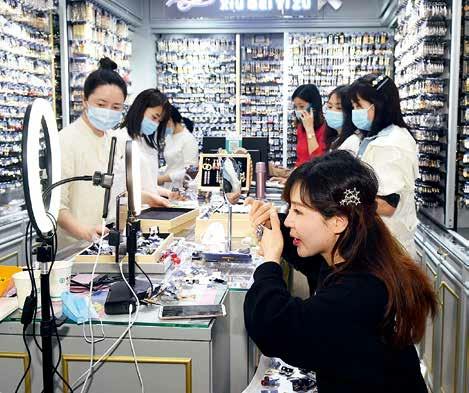“World’s Supermarket”Wading Through the Pandemic
2020-06-29byQiuYijiao
by Qiu Yijiao
As the COVID-19 pandemic spreads around the world, 75,000 stores and 200,000 dealers in the Yiwu International Trade City (YITC) in eastern Chinas Zhejiang Province suffer even more than those from other industries.
The YITC sells commodities to more than 200 countries and regions every year and is therefore dubbed the “worlds supermarket.”Since the outbreak of the pandemic, overseas demand has plummeted, transactions have been delayed, the flow of merchants has been limited, and new orders have severely dropped off.
Addressing the adverse effects of the pandemic head on, dealers in the YITC, operated by Zhejiang China Commodities City Group Co., Ltd., have managed to persist by actively transforming their business models to stabilize orders and expand in the global market.
Today, the “worlds supermarket”still maintains daily customer flow of 100,000 people including 30,000 purchasers, with 93 percent of its stores resuming operations and the export volume of standard containers reaching nearly 90 percent of the level of last year.
Necessary Change
Because the operation of the 75,000 stores in the YITC affects the fate of two million small and medium-sized enterprises (SME), the local government of Yiwu launched a series of 20 stimulus measures to boost the market on March 11, 2020, such as expanding the upstream industrial chain and promoting online-offline integration. The operator of the YITC has also applied for a billion yuan (about US$141 million) in loans for stores and relevant SME owners.
In the YITC, survival has become a common goal of every tenant. The pandemic has shined intense light on the business owners role in the international small commodity trade and industrial chains, so they began to explore further.
Zhang Xiaoai, owner of Snow White Toy Store, began to invest more time in product innovation and production management. Jin Jing of Haoran Clothing made“big moves” to launch eight new products and invested heavily in promotion. Wang Xuxue of Miaomiao Toy Store moved business online and sent the latest samples to merchants.
Liu Pingjuan, who has been distributing kitchenware for 30 years, just started doing livestreaming to show the actual production state of her factory to potential partners. As Yiwu has continuously released new products, Liu testified to global business partners that it remains the“worlds supermarket” thanks to enough supply and reliable products.
After weathering countless battles in the market arena, these business owners have been quick to break through traditional modes and operational inertia.
Zhang Jiying, who supplies rain gear, abandoned a best-selling but less profitable umbrella and transformed it into a highermarkup boutique product. The newly launched embroidered umbrella, priced at more than 1,000 yuan (about US$141) each, has become a popular online purchase among young people.“New demand is emerging, and we are seizing the opportunity,”Zhang declared.
The “worlds supermarket” has recently resembled a movie lot, with online celebrities shuttling through stores to promote certain products and increasing numbers of dealers starting to try livestreams. Some stores invested in major decorations to attract customers with a brand-new image.
New distribution channels dug by e-commerce enterprises entering the market and selling Yiwu products online are promoting online-offline integration and accel- erating market recovery.
New Market Access
“Trade never dies” is the common understanding of almost all merchants in Yiwu. But traditional trade modes and channels have to transform with an unprecedented speed. “Uncertainty”has become a “new normal” for business owners.
“Whatever the crisis is, the market will remain strong if we keep working to make trade more convenient and costs lower,” remarked Wang Dong, general manager of Zhejiang China Commodities City Group Co., Ltd. “The pandemic has accelerated our transformation into a trading service integrator.”
On March 13, the group announced the plan to form a wholly-owned subsidiary, China Small Commodity City Big Data Co., Ltd., as a comprehensive trading service platform for the YITC.
In recent years, some Yiwu merchants with a great sensitivity to market changes have begun expanding into Africa and South America, including those who sealed deals on Electronic World Trade Platform(eWTP) projects with partners in Rwanda and Ethiopia.
Future interactions between Yiwu and those two African countries will include not only small commodities, but also equipment and auxiliary materials for small commodities production. The aim is to help physical small commodity markets emerge in those countries alongside supplychain facilities and commercial services such as logistics, customs clearance, trade, and finance.
Despite so few overseas merchants visiting because of the pandemic, business owners in Yiwu are managing to move the market forward by improving product exhibition and sales via overseas warehouses so overseas customers can conveniently buy from home.
When overseas demand plummeted, businesspeople in Yiwu organized many events on distributing epidemic prevention materials and launched various new products to meet new demands. The challenges brought by the pandemic have pushed the dealers of the YITC to become more sensitive to the global market and innovate business channels to get through the crisis.
